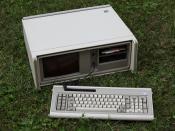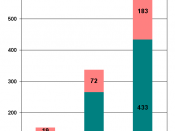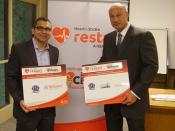Many older people are not comfortable using computers to accomplish everyday tasks such as word-processing or accessing the internet; this is due in part to a lack of exposure and not having the patience or desire to learn to use these devices. Others simply do not see a need in their life to learn basic computing skills simply because they have lived most of their lives without being required to interact with a computer or are simply terrified of the thought of using one.
Lets take a moment examine what life was like before the digital revolution swept a tide of change throughout our world. Stepping back in time twenty or more years we see a slower world where information was not as abundant nor freely flowing as it is today. During this time, computers filled entire basements of office buildings, cost tens of thousands of dollars and were not a common occurrence in everyday life for ordinary people.
If someone wanted to send a letter to friends or family, all one could do was grab a pen, paper and write a letter. Then toss it into a stamped envelope, drop it off at the local post office and the deed was done. Another example, record keeping, was limited to specially designed notebooks and stored away in untold rows of filing cabinets with various other forms and folders. Lastly, the telephone was the only way to talk to someone in real time over vast distances and carried a hefty fee for the luxury. Life has always been this way and everyone is comfortable with this situation.
Then suddenly the world seemed to change over night during the mid-nineties by the unleashing of the Internet. Personal computers gained momentum within our daily lives slowly with email, entranced us with instant messaging, online banking, data processing and anything else you can imagine. Businesses began to utilize computing in completely new ways and entire industries were born; the digital revolution had begun. "What happened to the older people in the world when this change came upon us?" we ask ourselves. They stood there scratching their heads while a new world was born in front of their very eyes. To stay competitive in all industries people were forced to learn new skills and to think in new ways. Computers today are more complex and smaller than ever. They have come from the basement of large corporations to the pockets of ordinary every day people in such a short time.
From my own experience in the technology sector, I have seen several scenarios where people are afraid to turn a computer on simply because they are afraid to mess it up. I have also seen times when someone is too proud to ask for help. Naturally the older a person is the more uncomfortable they are going to be with technology because it has been thrust into their lap after living most of their life without it. The reason being they have lived most of their lives without using a PC in the home and do not feel a need to change because they have made it this long without it. Another good example I can take directly from my own workplace. Older doctors are ignorant when it comes to computers; trying to show them how to use a computer is like showing a four year old how to do trigonometry. They do not understand it or have a desire to learn it no matter how hard you try however; this same doctor has an abundance of intelligence. Which tell us this cannot be related to intelligence but rather a desire and comfort level or lack there of inside each individual.
It is possible to harness the skills of basic computing regardless of age however; one will not learn these skills in a day or even a week. Consistently having daily interaction with a computer is really the only way one can gain confidence and start to become comfortable using any technology.





